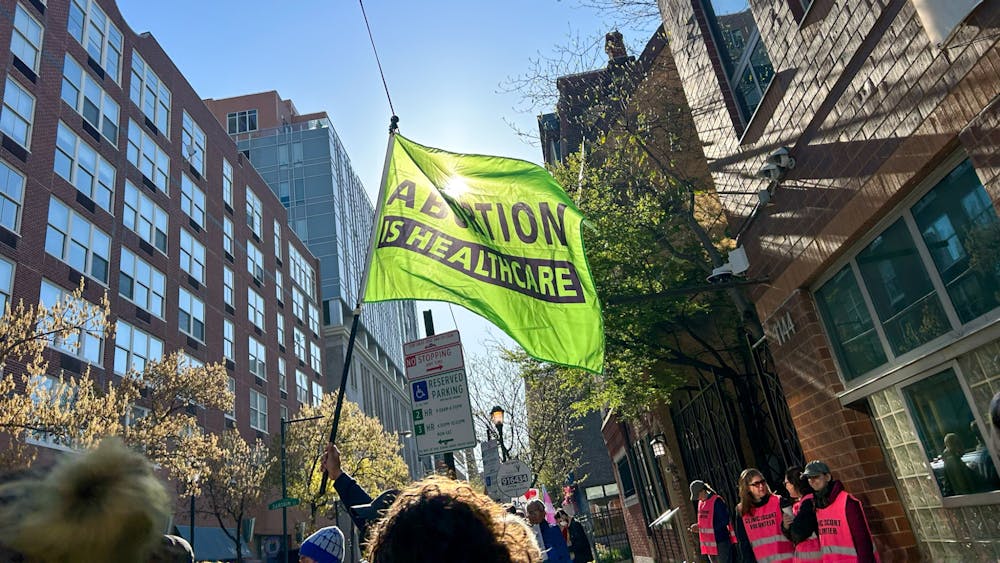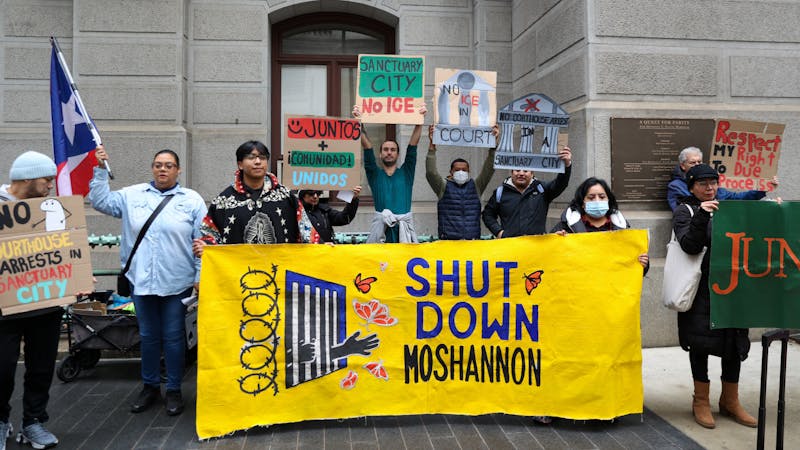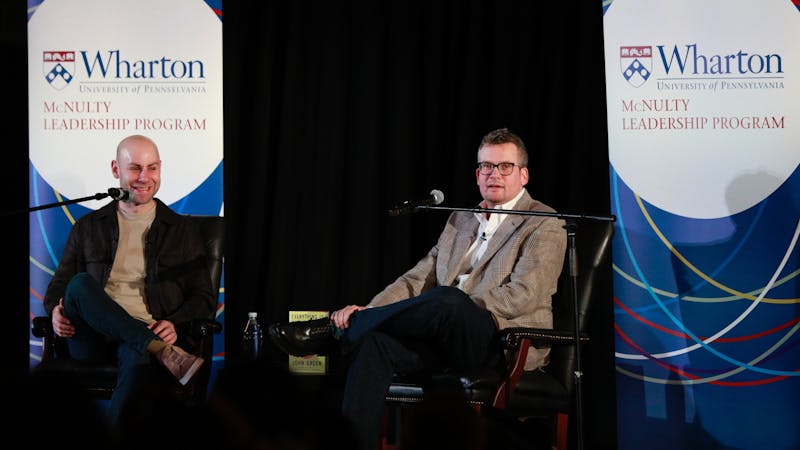On April 18, 2025, the date of Good Friday in the Christian faith this year, two groups face off at 12th and Locust. Roughly 100 anti–abortion protesters arrive in front of Planned Parenthood Health Center. As they move towards the entrance, however, they are met by the human wall of the Philadelphia Abortion Rights Coalition. The group stands shoulder–to–shoulder defense, keeping the sidewalk in front of Planned Parenthood clear and the entrance accessible for incoming patients.
Anti–abortion protests such as this one have been raging on ever since abortion was legalized by Roe v. Wade in 1973. These protests are not only emotionally distressing for patients but have also been a major safety threat to people trying to enter abortion clinics. Since 1977, anti–abortion activists have committed 11 murders, 42 bombings, 200 acts of arson, and 531 assaults, against patients and healthcare providers at abortion clinics.
That’s where the Philadelphia Abortion Rights Coalition comes in. Established in 2020, the group gathers about twice a month for “Clinic Defense” events. Clinics like the Planned Parenthood at 12th and Locust have clinic escorts, marked by bright pink vests. They walk patients in and out of the clinic to ensure their safety. But, on an average weekday, there are usually only one to two escorts, who find themselves outnumbered by protesters.
Amid all of this, defenders have to “deal with the logistics of actually showing somebody, this is where you park, this is where the entrance is. Here I can answer your questions,” says Kateri, Clinic Escort and Philadelphia Abortion Rights Coalition member. “Meanwhile, you're also trying to block them from dealing with these protestors across the street. So we were like, how can we support the escorts?”
The Coalition started postering in front of the crisis pregnancy center just down the street on Locust. Crisis pregnancy centers are facilities that present themselves as legitimate healthcare centers, but provide little to no medical services. Instead, when people enter seeking reproductive care, they are met with anti–abortion propaganda from staff members with no medical training. Patients are told that there are links between abortion and breast cancer, infertility, mental illness, and other factors. None of this is factually correct. They also may be told that they are further along in their pregnancy than they actually are, and are no longer eligible for an abortion.
“We started out standing in front of that to just tell people that it's not an abortion clinic, even though it poses as one, and hand out information, and then we eventually started doing clinic defense,” says Caroline, another organizing member of the Philadelphia Abortion Rights Coalition, who preferred not to give a last name for safety reasons.
Good Friday’s clinic defense is unusually large and confrontational. On the holiday, large church groups gather at the clinic, sometimes hundreds of people, to discourage patients from entering their appointments. The morning began with just a few older men and priests. One man holds a sign that reads, “Jesus died so all could live." However, by about 9 a.m., more than fifty kids come to join the protest. Mission Youth, a Christian youth group, completely engulfs the street. Large wooden crosses are driven in on a pickup truck. A tent is pitched, and a flag is raised. They drop to their knees a few feet in front of the Abortion Rights Coalition members and begin to pray. Clearly, this is a well–oiled machine.
“They're there every day. They get paid by the Pro–Life Union in cash. So it's like a job for them,” says Kateri.
The majority of the pro–life group is male, a stark contrast from the opposing coalition. A large middle–aged man argues with an Abortion Rights Coalition member where the groups meet face–to–face. A first voice rings out, “We’re giving people the freedom of choice!” Then another shoots back, “We’re giving people the freedom to make the right choice.”
The clinic defenders respond with their own chants. “When abortion rights are under attack, what do we do? Stand up, fight back!” Then, “Keep your rosaries off our ovaries!” Another goes, “pro–life, you’re the killer. We remember Dr, Tiller!” The chant references Dr. George Tiller, an abortion provider, who was murdered by an anti–abortion zealot while attending church in 2009. Someone starts playing “Freedom! ‘90” by George Michael over a speaker, effectively drowning out the anti–abortion protestors. Nurses on their way in to work share their appreciation, and passing cars honk out support.
A few church groups from St. Peter’s Episcopal Church and First Unitarian Church have also joined in on the clinic defense. Though no one wished to be quoted, members expressed frustration with the picture anti–abortion protestors paint of religious people. One woman holds a sign that reads, "Mary had a choice." Another woman’s sign says, "Blessed are the Clinic Defenders."
“Because the protesters, the antis today, are coming from a religious lens, it's important to realize that Evangelical Christianity is only one type of religion,” says Victoria, an organizing member of the coalition who also preferred not to give a last name for safety reasons. “Many Jews, Muslims, Presbyterians, even some Catholics actually—there's this group called Catholics for Choice—lots of religious people do feel like abortion is a right and something to be protected.”
The aim today is to separate impositions of personal religious beliefs from matters of healthcare. “If I was going into my dentist's office and somebody popped out at me and said, ‘You don't need a filling, talk to the Lord,’ I would be really upset and rattled,” says Victoria. “It's very confusing when you're just trying to get healthcare. For some people, it's a really easy decision. It's what's right for them and everything. But, for the people who are uncomfortable, we want to be here to show that a lot of people in Philadelphia support them. That they're not alone.”
Later in the morning, Kateri shares her personal experience with abortion, which she has spoken about publicly in the past and agreed to have published. “I had two abortions when I was in a very abusive marriage. If I wouldn't have had access to those, I would probably not still be here. Or at the very least, he would be able to know where the kids are forever, and so he would know where I am forever.” Kateri goes on, “The woman that he married after me, he almost killed her, and they have kids together. Now, she can't really fully escape him because she has his kids. He has some legal rights, and he refuses to terminate his parental rights.”
But accessing the abortions that saved her life was disrupted by protests like the one that rages on beside us. “When I came for my two abortions, there were big protests both days,” she says. The protestors bombarded Kateri with names like, “baby killer” and held up signs that pictured dismembered fetuses. “They were really touching me, grabbing me, in my space. And it was really, really upsetting and traumatic,” Kateri recalls. “There were escorts but they were just so outnumbered.”
This experience is what initially pushed her to become a clinic escort. “I could definitely see someone that was younger or in a more vulnerable position than I was in seeing that crowd and being like, I can't do this today. I just can't walk through this crowd today,” explains Kateri. “So that's how I got into escorting, just wanting to be a safe person there.”
The need for such defenses is growing rapidly. In 1993, Congress passed the Freedom of Access to Clinic Entrances (FACE) Act, which criminalizes the use of force or threat of force to obstruct a person’s access to an abortion clinic. This came in response to the violence of protests after the Roe v. Wade decision. However, the Trump administration recently has been working to weaken the enforcement of the FACE Act. According to a Department of Justice memo, “Prosecutions and civil actions will be permitted only in extraordinary circumstances, or in cases presenting significant aggravating factors, such as death, serious bodily harm, or serious property damage.” President Trump has already pardoned 23 people convicted under the FACE Act.
“I think that the antis are gonna get more bold again and start trying to do things like blockade clinics and can get more aggressive and violent,” says Caroline. “But, like today, we have easily 50 people out here. No one's gonna try to assault a nurse with that.”
When we criminalize abortion care, we place limits on many forms of female health care, far beyond the realm of abortion. Criminalization also discourages medical professionals from providing life–saving procedures for fear of criminal charges. We are already seeing cases of women who are unable to seek miscarriage care and women forced to carry non–viable pregnancies, both of which have the potential for physical and emotional distress at best, and fatal at worst.
Since the passing of Dobbs v Jackson, many abortion clinics have gone out of business. These clinics don’t provide solely abortion care: Destroying Planned Parenthood centers on the basis of providing abortion care ends up robbing communities of all the general gynecological care provided by these organizations as well, such as STD testing, access to birth control, emergency contraception, and general reproductive care consultations.
The Penn Reproductive Justice Club, created in response to the overturn of Roe v. Wade, has also initiated efforts to combat threats to systems that provide reproductive care. They have begun a Plan B delivery service to help ensure students’ access to emergency contraception, without judgment or financial burden. They have also installed a vending machine on the fourth floor of the ARCH which provides health products including Plan B, condoms, and menstrual products.
“Penn Reproductive Justice’s mission is to ensure that students have all the resources and education to make informed choices about their reproductive and sexual health needs,” says Antoilyn Nguyen, Co–Founder and Community Engagement Lead of Penn Repro Justice. “A big part of that is making sure students have the actual, physical products to take care of their health.”
The Philadelphia Abortion Rights Coalition is involved in the broader issues surrounding access to abortion care and the dangers America is currently facing, but clinic defense days are first and foremost about protecting individuals. “Right now, we're just here for the patients,” says Victoria. “We're here to show that Philadelphia supports them.”






